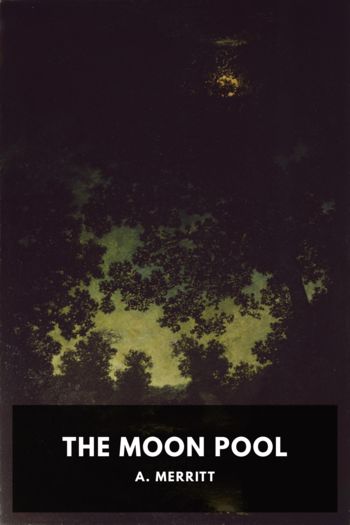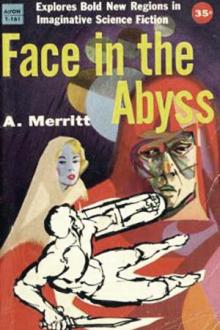The Moon Pool - A. Merritt (top novels .TXT) 📗

- Author: A. Merritt
Book online «The Moon Pool - A. Merritt (top novels .TXT) 📗». Author A. Merritt
“Now what are we up against?” grumbled O’Keefe.
The green dwarf stretched a hand; stiffened; gazed over to the left of us beyond a lower hillock upon whose broad crest lay a file of the moss shapes. They fringed it, their mitres having a grotesque appearance of watching what lay below. The glistening road lay there—and from it came a shout. A dozen of the coria clustered, filled with Lugur’s men and in one of them Lugur himself, laughing wickedly!
There was a rush of soldiers and up the low hillock raced a score of them toward us.
“Run!” shouted Rador.
“Not much!” grunted Larry—and took swift aim at Lugur. The automatic spat: Olaf’s echoed. Both bullets went wild, for Lugur, still laughing, threw himself into the protection of the body of his shell. But following the shots, from the file of moss heaps on the crest, came a series of muffled explosions. Under the pistol’s concussions the mitred caps had burst and instantly all about the running soldiers grew a cloud of tiny, glistening white spores—like a little cloud of puffball dust many times magnified. Through this cloud I glimpsed their faces, stricken with agony.
Some turned to fly, but before they could take a second step stood rigid.
The spore cloud drifted and eddied about them; rained down on their heads and half bare breasts, covered their garments—and swiftly they began to change! Their features grew indistinct—merged! The glistening white spores that covered them turned to a pale yellow, grew greenish, spread and swelled, darkened. The eyes of one of the soldiers glinted for a moment—and then were covered by the swift growth!
Where but a few moments before had been men were only grotesque heaps, swiftly melting, swiftly rounding into the semblance of the mounds that lay behind us—and already beginning to take on their gleam of ancient viridescence!
The Irishman was gripping my arm fiercely; the pain brought me back to my senses.
“Olaf’s right,” he gasped. “This is hell! I’m sick.” And he was, frankly and without restraint. Lugur and his others awakened from their nightmare; piled into the coria, wheeled, raced away.
“On!” said Rador thickly. “Two perils have we passed—the Silent Ones watch over us!”
Soon we were again among the familiar and so unfamiliar moss giants. I knew what I had seen and this time Larry could not call me—superstitious. In the jungles of Borneo I had examined that other swiftly developing fungus which wreaks the vengeance of some of the hill tribes upon those who steal their women; gripping with its microscopic hooks into the flesh; sending quick, tiny rootlets through the skin down into the capillaries, sucking life and thriving and never to be torn away until the living thing it clings to has been sapped dry. Here was but another of the species in which the development’s rate was incredibly accelerated. Some of this I tried to explain to O’Keefe as we sped along, reassuring him.
“But they turned to moss before our eyes!” he said.
Again I explained, patiently. But he seemed to derive no comfort at all from my assurances that the phenomena were entirely natural and, aside from their more terrifying aspect, of peculiar interest to the botanist.
“I know,” was all he would say. “But suppose one of those things had burst while we were going through—God!”
I was wondering how I could with comparative safety study the fungus when Rador stopped; in front of us was again the road ribbon.
“Now is all danger passed,” he said. “The way lies open and Lugur has fled—”
There was a flash from the road. It passed me like a little lariat of light. It struck Larry squarely between the eyes, spread over his face and drew itself within!
“Down!” cried Rador, and hurled me to the ground. My head struck sharply; I felt myself grow faint; Olaf fell beside me; I saw the green dwarf draw down the O’Keefe; he collapsed limply, face still, eyes staring. A shout—and from the roadway poured a host of Lugur’s men; I could hear Lugur bellowing.
There came a rush of little feet; soft, fragrant draperies brushed my face; dimly I watched Lakla bend over the Irishman.
She straightened—her arms swept out and the writhing vine, with its tendrilled heads of ruby bloom, five flames of misty incandescence, leaped into the faces of the soldiers now close upon us. It darted at their throats, striking, coiling, and striking again; coiling and uncoiling with incredible rapidity and flying from leverage points of throats, of faces, of breasts like a spring endowed with consciousness, volition and hatred—and those it struck stood rigid as stone with faces masks of inhuman fear and anguish; and those still unstricken fled.
Another rush of feet—and down upon Lugur’s forces poured the frog-men, their booming giant leading, thrusting with their lances, tearing and rending with talons and fangs and spurs.
Against that onslaught the dwarfs could not stand. They raced for the shells; I heard Lugur shouting, menacingly—and then Lakla’s voice, pealing like a golden bugle of wrath.
“Go, Lugur!” she cried. “Go—that you and Yolara and your Shining One may die together! Death for you, Lugur—death for you all! Remember Lugur—death!”
There was a great noise within my head—no matter, Lakla was here—Lakla here—but too late—Lugur had outplayed us; moss death nor dragon worm had frightened him away—he had crept back to trap us—Lakla had come too late—Larry was dead—Larry! But I had heard no banshee wailing—and Larry had said he could not die without that warning—no, Larry was not dead. So ran the turbulent current of my mind.
A horny arm lifted me; two enormous, oddly gentle saucer eyes were staring into mine; my head rolled;





Comments (0)